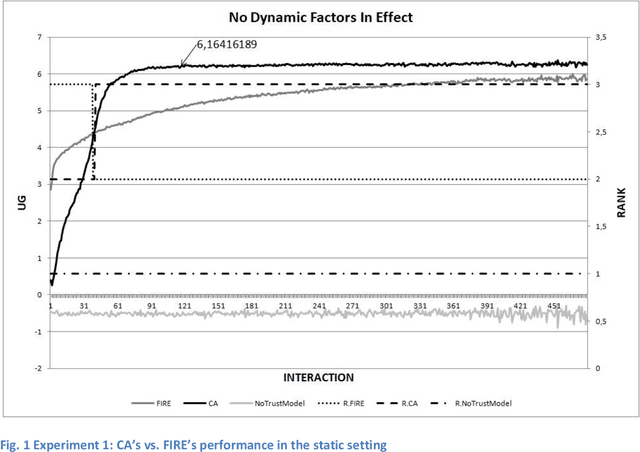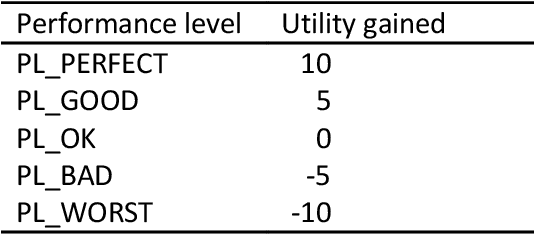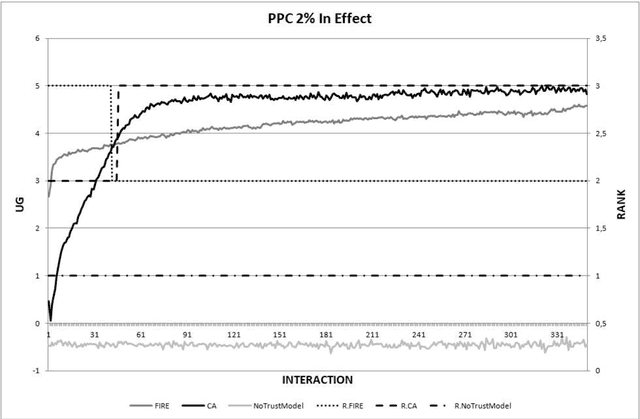Zoi Lygizou
A biologically Inspired Trust Model for Open Multi-Agent Systems that is Resilient to Rapid Performance Fluctuations
Apr 17, 2025Abstract:Trust management provides an alternative solution for securing open, dynamic, and distributed multi-agent systems, where conventional cryptographic methods prove to be impractical. However, existing trust models face challenges related to agent mobility, changing behaviors, and the cold start problem. To address these issues we introduced a biologically inspired trust model in which trustees assess their own capabilities and store trust data locally. This design improves mobility support, reduces communication overhead, resists disinformation, and preserves privacy. Despite these advantages, prior evaluations revealed limitations of our model in adapting to provider population changes and continuous performance fluctuations. This study proposes a novel algorithm, incorporating a self-classification mechanism for providers to detect performance drops potentially harmful for the service consumers. Simulation results demonstrate that the new algorithm outperforms its original version and FIRE, a well-known trust and reputation model, particularly in handling dynamic trustee behavior. While FIRE remains competitive under extreme environmental changes, the proposed algorithm demonstrates greater adaptability across various conditions. In contrast to existing trust modeling research, this study conducts a comprehensive evaluation of our model using widely recognized trust model criteria, assessing its resilience against common trust-related attacks while identifying strengths, weaknesses, and potential countermeasures. Finally, several key directions for future research are proposed.
Using Deep Q-Learning to Dynamically Toggle between Push/Pull Actions in Computational Trust Mechanisms
Apr 28, 2024



Abstract:Recent work on decentralized computational trust models for open Multi Agent Systems has resulted in the development of CA, a biologically inspired model which focuses on the trustee's perspective. This new model addresses a serious unresolved problem in existing trust and reputation models, namely the inability to handle constantly changing behaviors and agents' continuous entry and exit from the system. In previous work, we compared CA to FIRE, a well-known trust and reputation model, and found that CA is superior when the trustor population changes, whereas FIRE is more resilient to the trustee population changes. Thus, in this paper, we investigate how the trustors can detect the presence of several dynamic factors in their environment and then decide which trust model to employ in order to maximize utility. We frame this problem as a machine learning problem in a partially observable environment, where the presence of several dynamic factors is not known to the trustor and we describe how an adaptable trustor can rely on a few measurable features so as to assess the current state of the environment and then use Deep Q Learning (DQN), in a single-agent Reinforcement Learning setting, to learn how to adapt to a changing environment. We ran a series of simulation experiments to compare the performance of the adaptable trustor with the performance of trustors using only one model (FIRE or CA) and we show that an adaptable agent is indeed capable of learning when to use each model and, thus, perform consistently in dynamic environments.
A biologically inspired computational trust model for open multi-agent systems which is resilient to trustor population changes
Apr 13, 2024



Abstract:Current trust and reputation models continue to have significant limitations, such as the inability to deal with agents constantly entering or exiting open multi-agent systems (open MAS), as well as continuously changing behaviors. Our study is based on CA, a previously proposed decentralized computational trust model from the trustee's point of view, inspired by synaptic plasticity and the formation of assemblies in the human brain. It is designed to meet the requirements of highly dynamic and open MAS, and its main difference with most conventional trust and reputation models is that the trustor does not select a trustee to delegate a task; instead, the trustee determines whether it is qualified to successfully execute it. We ran a series of simulations to compare CA model to FIRE, a well-established, decentralized trust and reputation model for open MAS under conditions of continuous trustee and trustor population replacement, as well as continuous change of trustees' abilities to perform tasks. The main finding is that FIRE is superior to changes in the trustee population, whereas CA is resilient to the trustor population changes. When the trustees switch performance profiles FIRE clearly outperforms despite the fact that both models' performances are significantly impacted by this environmental change. Findings lead us to conclude that learning to use the appropriate trust model, according to the dynamic conditions in effect could maximize the trustor's benefits.
 Add to Chrome
Add to Chrome Add to Firefox
Add to Firefox Add to Edge
Add to Edge